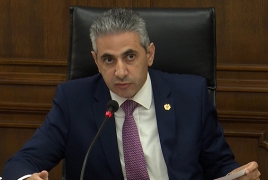
At the first-instance criminal court in Yerevan, a discussion took place regarding the preventive measure for public and political figure Edgar Ghazaryan. The court rejected the petition to involve others, including Prime Minister Nikol Pashinyan and National Assembly Speaker Alen Simonyan, in the investigation.
Ghazaryan emphasized that the case should be dismissed, as it is based on an unlawful document. According to him, the starting point of the case was a personal letter from the head of the Constitutional Court's staff to the Prosecutor General, which was not registered in a proper journal, reports Panorama.am .
Additionally, Ghazaryan stated that the public prosecutor, Hayk Avetyan, had developed a subjective attitude towards him.
“Mr. Avetyan rejected our defense team's motion to involve other individuals—Nikol Pashinyan, MP Alen Simonyan, Andranik Kocharyan, Arusyak Julhakyan—as defendants, which shows that Mr. Avetyan was inclined not to conduct an impartial and comprehensive investigation into the case but to take specific actions against me, making decisions that we believe to be unlawful,” said Ghazaryan.
He believes that the prosecutor's behavior could have dangerous consequences for the case's future. According to Ghazaryan, Avetyan's actions contain certain elements that reflect provisions set out in Article 480 of the Criminal Code, which deals with the persecution of innocent individuals and related norms.
He added that in order to make legal assessments, it is necessary for Avetyan to be removed from his procedural position in this case.
“In order to initiate a legal process and make legal assessments, it is first necessary for Mr. Avetyan to be removed from this case and have no procedural status,” Ghazaryan stated.
Edgar Ghazaryan has been charged under Part 2 of Article 490 of the Criminal Code for discrediting the activities of judges, which carries a prison sentence of 2 to 5 years. He has been placed under administrative supervision, prohibiting him from making any public comments regarding judges, investigators, prosecutors, or enforcement officers until the case is concluded.

